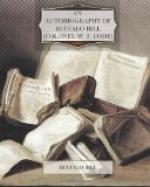While we were thus idle a party was organized to carry the war into the Indians’ own country, and teach them that the white man’s property must be let alone. This party I joined.
Stage-drivers, express-riders, stock-tenders and ranchmen, forty in number, composed this party. All were well armed; all were good shots, and brave, determined men. “Wild Bill” Hickock, another of the Western gunmen of whom I shall have something to tell later, was captain of the expedition. He had come recently to our division as a stage-driver and had the experience and courage necessary to that kind of leadership.
Twenty miles out from Sweetwater Bridge, at the head of Horse Creek, we found an Indian trail running north toward Powder River. We could see that the horses had been recently shod, conclusive proof that they were our stolen stock. We pushed on as fast as we could along the trail to the Powder, thence down this stream to within forty miles of where old Fort Reno now stands. Farther on, at Crazy Woman’s Fork, we saw evidence that another party had joined our quarry. The trail was newly made. The Indians could be hardly more than twenty-four hours ahead of us. And plainly there was a lot of them.
When we reached Clear Creek, another tributary of the Powder, we saw horses grazing on the opposite bank. Horses meant Indians. Never before had the redskins been followed so far into their own country. Not dreaming that they would be pursued they had failed to put out scouts.
We quickly got the “lay” of their camp, and held a council to decide on how to attack them. We knew that they outnumbered us three to one—perhaps more. Without strategy, all we would get for our long chase would be the loss of our scalps.
“Wild Bill,” who did not know the meaning of fear, made our plan for us. We were to wait till nightfall, and then, after creeping up as close as possible on the camp, make a grand ride right through it, open a general fire upon them, and stampede their horses.
It was a plan that called for nerve, but we were full of spirit, and the more danger there was in an enterprise the more we relished it. At our captain’s signal we rushed pell-mell through their camp. Had we dropped from the clouds the Indians could not have been more astonished. At the sound of our shots they scattered in every direction, yelling warnings to each other as they fled.
Once clear of the camp we circled to the south and came back to make sure that we had done a thorough job. A few parting shots stampeded the stragglers. Then, with one hundred captured ponies—most, if not all of them, stolen from the Express and State stations—we rode back to Sweetwater Bridge.
The recovered horses were placed on the road again, and the Express was resumed. Slade, who was greatly pleased with our exploit, now assigned me as special or supernumerary rider. Thereafter while I was with him I had a comparatively easy time of it, riding only now and then, and having plenty of opportunity for seeking after the new adventures in which I delighted.




